
Carl Lee Perkins was an American guitarist, singer and songwriter. A rockabilly great and pioneer of rock and roll, he began his recording career at the Sun Studio, in Memphis, beginning in 1954. Among his best-known songs are "Blue Suede Shoes", "Honey Don't", "Matchbox" and "Everybody's Trying to Be My Baby".

Nebraska is the sixth studio album by the American singer-songwriter Bruce Springsteen, released on September 30, 1982, by Columbia Records. Springsteen recorded the songs as demos on a 4-track recorder, intending to rerecord them with the E Street Band, but decided to release them as they were. Nebraska remains one of the most highly regarded albums in his catalogue, and was ranked number 150 in Rolling Stone's 2020 edition of its "The 500 Greatest Albums of All Time" list.

Human Touch is the ninth studio album by American singer-songwriter Bruce Springsteen. The album was released on March 31, 1992, the same day as Lucky Town. It was the more popular of the two, peaking at number two on the US Billboard 200 chart, and lead single "Human Touch" peaking at number one on the Mainstream Rock and number 16 on the Billboard Hot 100 charts. "Human Touch" has since Platinum by the Recording Industry Association of America (RIAA) for over one million copies sold in the US, and was nominated for Best Rock Vocal Performance at the 1993 Grammy Awards.
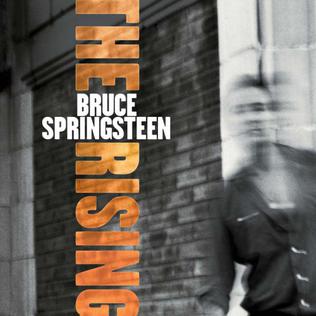
The Rising is the twelfth studio album by the American singer-songwriter Bruce Springsteen, released on July 30, 2002, on Columbia Records. The album is based in large part on Springsteen's reflections in the aftermath of the September 11 attacks the year before. The album was a critical and commercial success, representing Springsteen's first album to top the US Billboard 200 since Tunnel of Love in 1987.

"Folsom Prison Blues" is a song by American singer-songwriter Johnny Cash. Written in 1953, it was first recorded and released as a single in 1955, and later included on his debut studio album Johnny Cash with His Hot and Blue Guitar! (1957), as the album's eleventh track. Borrowing liberally from Gordon Jenkins' 1953 song, "Crescent City Blues", the song combines elements from two popular folk styles, the train song and the prison song, both of which Cash continued to use for the rest of his career. It was one of Cash's signature songs. Additionally, this recording was included on the compilation album All Aboard the Blue Train (1962). In June 2014, Rolling Stone ranked it No. 51 on its list of the 100 greatest country songs of all time.
"Long Black Veil" is a 1959 country ballad, written by Danny Dill and Marijohn Wilkin and originally recorded by Lefty Frizzell.
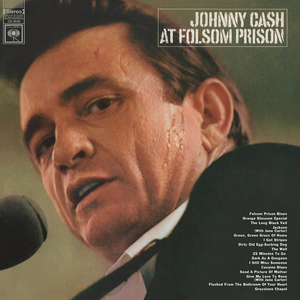
Johnny Cash at Folsom Prison is the first live album by American singer-songwriter Johnny Cash, released on Columbia Records on May 6, 1968. After his 1955 song "Folsom Prison Blues", Cash had been interested in recording a performance at a prison. His idea was put on hold until 1967, when personnel changes at Columbia Records put Bob Johnston in charge of producing Cash's material. Cash had recently controlled his drug abuse problems, and was looking to turn his career around after several years of limited commercial success. Backed by June Carter, Carl Perkins, and the Tennessee Three, Cash performed two shows at Folsom State Prison in California on January 13, 1968. The initial release of the album consists of fifteen songs from the first show and two from the second.
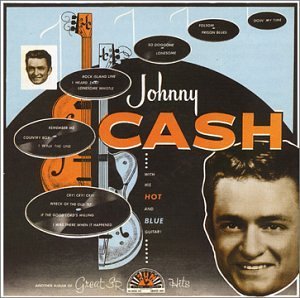
Johnny Cash with His Hot and Blue Guitar! is the debut studio album by American singer Johnny Cash, released on October 11, 1957. The album contained four of his hit singles: "I Walk the Line," "Cry! Cry! Cry!," "So Doggone Lonesome," and "Folsom Prison Blues." It was re-issued on July 23, 2002, as an expanded edition, under the label Varèse Vintage, containing five bonus tracks, three being alternate versions of tracks already on the original LP. In 2012, Columbia Records reissued the album with 16 additional non-album Sun Records tracks as part of its 63-disc Johnny Cash: The Complete Columbia Album Collection box set. In 2017, 60 years after the original release, the album was remastered under the title Johnny Cash with His Hot and Blue Guitar! . In 2022, Sun released a remastered edition of the original studio album, with only the original track listing. The songs had been remastered as to simulate being in the studio as the tracks were recorded.
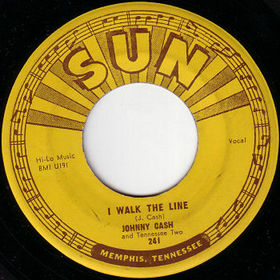
"I Walk the Line" is a song written and recorded in 1956 by Johnny Cash. After three attempts with moderate chart ratings, it became Cash's first #1 hit on the Billboard charts, eventually reaching #17 on the US pop charts.
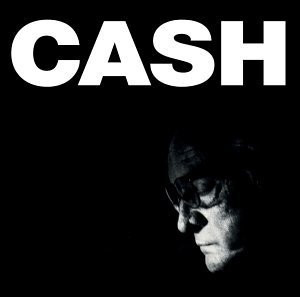
American IV: The Man Comes Around is the sixty-seventh and final non-posthumous studio album by Johnny Cash. It was released on November 5, 2002, by American Recordings and Universal Records. It is the fourth in Cash's "American" series of albums, and the last album released during his lifetime, and is considered some of his finest work towards the end of his life. The album was also included in the book 1001 Albums You Must Hear Before You Die.

"Ring of Fire" is a song made popular by Johnny Cash when it appeared on his 1963 album Ring of Fire: The Best of Johnny Cash. Written by Cash's eventual second wife, June Carter Cash, and Merle Kilgore, it was originally recorded as "(Love's) Ring of Fire" by June's sister, Anita Carter, on her 1963 album Folk Songs Old and New.

Warren Smith was an American rockabilly and country music singer and guitarist.
"Cry! Cry! Cry!" is the debut single by singer-songwriter Johnny Cash. The song was originally released in 1955 and reached number 14 on the Best Sellers charts.

"The Wanderer" is a song written by Ernie Maresca and originally recorded by Dion, released on his 1961 album Runaround Sue. The song, with a 12-bar blues-base verse and an eight-bar bridge, tells the story of a travelling man and his many loves. The song is ranked number 243 on the Rolling Stone magazine's list of The 500 Greatest Songs of All Time.
"Johnny 99" is a song written and recorded by rock musician Bruce Springsteen, which first appeared on Springsteen's 1982 solo album Nebraska.

"Brilliant Disguise" is a song by Bruce Springsteen from his 1987 album Tunnel of Love. It was released as the first single from the album, reaching the No. 5 position on the Billboard Hot 100 chart and No. 1 on the Mainstream Rock chart in the United States. The follow-up single, "Tunnel of Love", also reached No. 1 on the Mainstream Rock Tracks chart, giving Springsteen two consecutive No. 1's. The single reached the top 10 in four additional countries including Canada and Ireland and the top 20 in Australia, Netherlands and the United Kingdom. "Brilliant Disguise" was nominated for Best Male Pop Vocal Performance at the 1988 Grammy Awards.

"One Step Up" is a song by Bruce Springsteen from his eighth studio album, Tunnel of Love (1987). It was released as the third single from the album, following "Brilliant Disguise" and the title track. It reached position #13 on the Billboard Hot 100 chart, #3 on the Adult Contemporary chart in the United States, and #23 in Canada. It also reached #2 on the U.S. Album Rock Tracks chart, giving Springsteen three straight top two tracks from the album. The song was only released as a single in America. One of the unreleased songs from 1980's The River, "Roulette", recorded April 3, 1979, was released as the b-side, using an alternate vocal mixed on April 12, 1980, that would also be used in 1998, when it was chosen for Tracks.

"Sea of Heartbreak" is a song written by Paul Hampton and Hal David and recorded by Don Gibson in 1961. The song reached #2 on the Billboard Hot Country Singles & Tracks chart.

Roy Orbison's Sun recordings were made by Orbison at Sun Studio with producer Sam Phillips. Sun Records was established in 1952 in Memphis, Tennessee, and during an eight-year period Phillips recorded such artists as Roy Orbison, B.B. King, Howlin' Wolf, Ike Turner, Rufus Thomas, Elvis Presley, Johnny Cash, Jerry Lee Lewis, Carl Perkins, Harold Jenkins, and Charlie Rich. The musicians signed at Sun Records made music that laid the foundation of rock and roll in the 20th century.
"My Sweet Love Ain't Around" is a song written and performed by Hank Williams. It was his third single on MGM Records released in January 1948.















